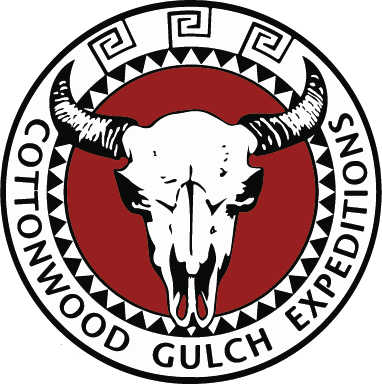Our Basecamp
Welcome to Basecamp!
Basecamp is the heart of our community. It is located in Thoreau, NM; on the edge of the Zuni mountains. We’ve called it home since 1936. Below is an interactive map of our camp followed by descriptions of each area within our camp.
Please Note: Our ArcGIS website connection is undergoing maintenance. To view the Basecamp map, click "Cancel" when asked to login to ArcGIS. You may have to click "cancel" more than once, but you do not require a login to view the map. Thank you for your understanding and patience!
Basecamp Entrance and Mess Hall Area
The Entrance to Basecamp
As you take a sweeping left-hand curve on Highway NM-612, the entrance to Basecamp is on the right. The property was originally purchased in 1934 and has been actively managed to preserve as much of the land as possible.
The Parking Lot and Ranch Gate
Passing through the ranch-style gate is like coming home to many previous trekkers. Just before the gate is our parking area. Keeping vehicles here ensures that Basecamp is quiet enough to hear all of nature's noises instead.
Pit Stop Bathroom
Built in 2019 by our YCC crew, the Pit Stop is our primary bathroom facility for the Mess Hall area. There are no flushing toilets at Basecamp, and we commonly refer to our bathrooms as latties, short for latrines. The Pit Stop has 4 stalls and was constructed primarily with leftover materials from other projects. The only things that go in our latties are whatever naturally comes out of our bodies, and a little toilet paper, but each stall has a trash can as well.
Farm
The farm was originally developed in 2008 and continues to be a place where students can learn about growing their own food and harvest vegetables that will get used in meals later in the day. It features 2 greenhouses, a shade structure, and in total, is about 1/3 of an acre. In addition to growing vegetables and native wildflowers, chickens are often present during the summer months.
The Mess Hall
The original mess hall started as a horse stable and now comfortably seats 80 people for our mealtimes. Trekkers and Staff sit at communal tables and eat "family style," passing around different dishes and making sure everyone has enough to eat.
New QM Building
Although not yet on the aerial map, our new Quartermaster building was finished in the summer of 2020 and provides space for treks to store and maintain gear. The deck between the Mess Hall and QM building is a great place to play guitar, do yoga or hang out with your friends! The upstairs is a multipurpose space that offers sleeping quarters in colder months or an indoor classroom space for programs.
QM Shack
Many years ago, when Cottonwood Gulch was a much smaller organization, the QM Shack was all the storage needed for camping gear. Now it is where some tools live, props for games on the field, and some of our mountain bikes that get used by trekkers.
Cha'oh
One of our favorite places for a campfire and a safe location to watch a summer monsoon, Cha'oh means shade structure in Diné. It is surrounded by grounded poles to make it safe in a lightning storm and provides large seating for any group gathering.
Pool
This is the 3rd pool that has existed on Basecamp property and remains a favorite place to cool off in the heat of the summer. The pool is only open when a certified lifeguard is there to open the facility.
The NAW
The Nature Arts Workshop offers opportunities to learn new crafts and arts that are focused in the outdoors and are specific to the Southwest. Metalwork, leatherwork, pottery, printing, and weaving are some of the options you might encounter here.
The Museum
The museum is the hub for our natural sciences. While our entire property is a classroom for biology, geology, and ecology, the museum houses a collection of natural and historical artifacts that provide a great starting place for knowing how to look for and identify elements of the natural world.
Hogan
We have 2 traditional Diné hogans on the property. They both provide a place to learn about traditional ways from one of our many Diné friends. They also occasionally get used for ceremonies by people in our community.
Staff Cabins
Staff Cabins are labeled with letters A through F (and "The Shed") and are reserved for our full-time administrative team. They are designed to sleep 2 people and feature open windows and a few places to store clothes and other gear.
Vonnegut Loop Cabins
This cabin loop is named after Kurt Vonnegut Sr., the architect. He traded designs for these cabins so Kurt Jr. could attend Cottonwood Gulch in 1937, just 3 years after the property was purchased. These cabins feature 6 bunks, open windows, and a fold-out table for playing cards, drawing, or writing letters home.
Cabin Latties
Spread throughout our cabin loops are smaller latties for use first thing in the morning and before bed at night. Most are composting toilets, but some are a more traditional pit toilet design.
Turquoise Trail Cabins
Completed in the summer of 2019, these new cabins were designed and built by the Colorado Building Workshop, a master's program at UC Denver. These cabins sleep 8, and with their glass windows and sliding doors, they are excellent for the colder months of the year. These cabins are named after the Turquoise Trail program, our all-girls program, in honor of all the women who have been a part of the gulch throughout the years and pioneers in offering outdoor programming to girls long before many other programs.
TT Kitchen
In addition to the cabins, a covered kitchen space was built to make mealtime easier for school groups who visit during the spring and fall or for final banquets at the end of the summer.
La-T-T
The newest lattie at Basecamp, the "La-TT," has 2 stalls and great views of red rocks while you do your business. Like the Pit Stop, it was also built using leftover materials from the TT Cabins, making it fit in with its buildings.
Outfit Area
The Outfit area is historically where the "Little Outfit" stayed, the youngest group of trekkers. It still gets used by our Outfit Expedition trek but is used by many others as well. It features 4 cabins that each sleep 8 people, 3 latties, and a campfire circle.
Directions to Basecamp
From Gallup and the West
- Take Interstate 40 East to Thoreau (Exit 53).
- As you exit the interstate, turn right on to State Road 612, heading south.
- Base Camp is almost exactly 6.5 miles, on the right, from that stop sign.
From Grants and the East
- Take Interstate 40 West to Thoreau (Exit 53).
- As you exit the interstate, turn left on the frontage road.
- At the next stop sign (~100 feet), turn left towards State Road 612 heading south (you will cross back underneath the interstate).
- Base Camp is almost exactly 6.5 miles, on the right, from that stop sign.
From Chaco Canyon, Farmington and the North
- Take State Road 371 south towards Crownpoint and Thoreau.
- 371 will enter the town of Thoreau from the north, heading straight for Interstate 40.
- Cross underneath Interstate 40, continuing straight, and 371 becomes State Road 612.
- Base Camp is almost exactly 6.5 miles, on the right, from Interstate 40.
Finding Base Camp
Base Camp is located on the western side of state road 612, south of Thoreau.
As you drive in on 612, you will wind your way up Wildcat canyon. Just before reaching the top, look for the large petrified log on your left (this is roadside geology, not a landmark – don't sweat it if you can't find it). You will crest a hill coming out of the canyon, and head back down into the plain.
Across the plain, there is a large wooded area. This is Base Camp. As you enter the trees, 612 bends to the left. Our gate is about half-way through that turn, on the right. There is a Cottonwood Gulch sign by the gate, although it is difficult to see at night
As you enter Base Camp, please be aware of other trekkers around about. The speed limit on our driveway is 15 mph, for both your safety and ours. Parking is to the left, as you enter Base Camp proper, just past the mess hall, the QM shack (a small log cabin with a red roof) and the solar panel.



